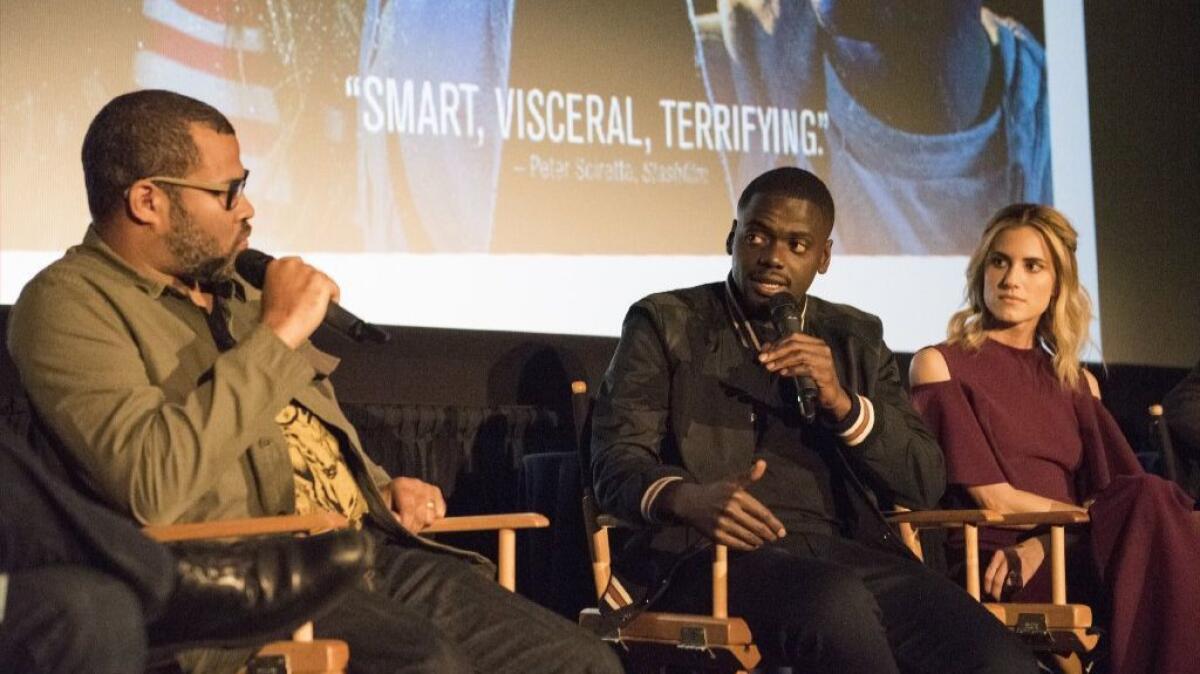Gold Standard: Too early to talk about the 2018 Oscars? Not if the movie is Jordan Peele’s ‘Get Out’

Standing in the middle of Wisteria Lane, Jordan Peele looked around with serious appreciation. The Universal Studios backlot area had been transformed Tuesday evening to resemble the stately neighborhood setting of “Get Out,” Peele’s celebrated horror movie about racism in America.
There was the creepy, impassive gardener standing on the front lawn of one house, raking leaves and staring blankly at passersby, while upstairs at another home, a woman dressed as the movie’s maid coolly looked down. (Believe me: Nobody was making eye contact with her.)
A garage had been converted into the bedroom of Allison Williams’ character, Rose, complete with milk and Fruit Loops. And that hypnotic video of the spoon stirring the cup of tea was playing in the living room (now basement) of a residence across the street. Stare at it too long and you might find yourself in the Sunken Place.
“Why did I go to Alabama?” Peele asks in jest. “I could have stayed home and shot the movie on Wisteria Lane.”
Peele, who wrote and directed the film, was joined by the movie’s stars — Daniel Kaluuya and Williams — and producers Jason Blum and Sean McKittrick for a lavish party pegged to the upcoming home entertainment release of “Get Out.”

The trailer for “Get Out,” written and directed by Jordan Peele.
Studios don’t really throw these kinds of home entertainment-related bashes any more. But then “Get Out,” Peele’s directorial debut made for $4.5 million, has now passed $200 million in worldwide box office. Peele just signed a two-year, first-look production deal with Universal, which also explains why Jeff Shell, chairman of Universal Filmed Entertainment Group, was there on the backlot street, along with Peter Cramer, the studio’s president of production.
So was Tony Angellotti, Universal’s longtime awards season consultant. Angellotti will be the first to tell you that it’s premature to have any kind of awards-season conversation before Labor Day, much less Memorial Day.
But let’s just put that wisdom aside for a moment and listen to the thoughts of a rival Oscar veteran, who, because of professional conflicts, requested anonymity.
“If Jordan Peele doesn’t get an original screenplay nomination for ‘Get Out,’ “ the consultant said, “it’s either going to be because 2017 was the greatest year for film this century or the academy has its head up its ….”
I’ll let you finish the thought.
If you haven’t seen “Get Out” (and if that’s the case, please fix your life), it opens with Chris (Kaluuya) and Rose (Williams) preparing for a long weekend visit with her parents. “Do they know I’m black?” Chris asks. The answer to that question is complicated and deeply unsettling, as Peele uses the horror genre to explore the ways that racism is alive and present in America.
See the most-read stories this hour »

“Halfway through the writing of it, I realized the movie was about slavery,” Peele told me at the event. “And that it was not only about slavery as we think of it in the past, but about modern slavery, about the prison industrial system, what Ava DuVernay laid out perfectly in ‘13th.’ We toss African American men and women into these dark cells for minor crimes for long periods of time and we neglect them. That systemic abduction is what this movie is about.”
Of course, for an unflinching look at suburban racism, police brutality and the slave trade, “Get Out” is also very funny and wildly entertaining. That’s the beauty of the genre, Peele said.
“Race is usually something dealt with with a certain amount of reverence, and appropriately so,” Peele said. “But people walking through the door to see a horror movie about race are sort of agreeing to go there. It’s an unspoken contract.”
Adds Blum, whose Blumhouse Productions specializes in micro-budget horror movies like “Paranormal Activity” and “The Purge”: “This is definitely my favorite movie I’ve ever worked on because of the conversation about race. It has completely changed the way I think about things.”

Halfway through the writing of it, I realized the movie was about slavery ... not only about slavery as we think of it in the past, but about modern slavery.
— Jordan Peele, “Get Out”
Peele calls himself the “biggest ‘Get Out’ geek there is,” and says he’d be happy to talk about the movie for the rest of his life. I’m guessing he’ll be talking about this American horror story all the way to the Academy Awards.
One scenario: A major critics group (probably the Los Angeles Film Critics Assn., of which I’m a member and which has a history of out-of-the-box choices) gives Peele a screenplay award and perhaps even best picture. The studio could then ride that momentum to the Oscars for an original screenplay nomination.
As for best picture, it really is much too early to kick off that discussion.
“I’m not quite there yet,” Peele said, expressing appreciation for the thought. “I’m such a fan of cinema. When I think of my favorite movies that have gotten that kind of prestige, I think of the best movies of all time.”
He added that his dream in making “Get Out” was to create something that people would enjoy and then talk about for a day or two afterward.
“Just a discussion,” Peele said. “No right or wrong answers. I just wanted to offer a way to talk.”
At that moment, a friend walked by and handed him a lapel pin fashioned after Kaluuya’s Chris character.
“Oh, my God,” Peele said, smiling, appraising the likeness. “This is amazing! This … this is one thing I could never have dreamed.”
MORE:
Jordan Peele’s clever horror-satire ‘Get Out’ is an overdue Hollywood response to our racial anxiety
Jordan Peele on ‘Get Out,’ the horror film about racism that Obama would love
How Allison Williams mined the horrors of white privilege for ‘Get Out’
Jordan Peele on how ‘Get Out’ defied the odds to become a full-blown cultural phenomenon
Jordan Peele explains ‘Get Out’s’ creepy milk scene, ponders the recent link between dairy and hate
Twitter: @glennwhipp
More to Read
From the Oscars to the Emmys.
Get the Envelope newsletter for exclusive awards season coverage, behind-the-scenes stories from the Envelope podcast and columnist Glenn Whipp’s must-read analysis.
You may occasionally receive promotional content from the Los Angeles Times.








